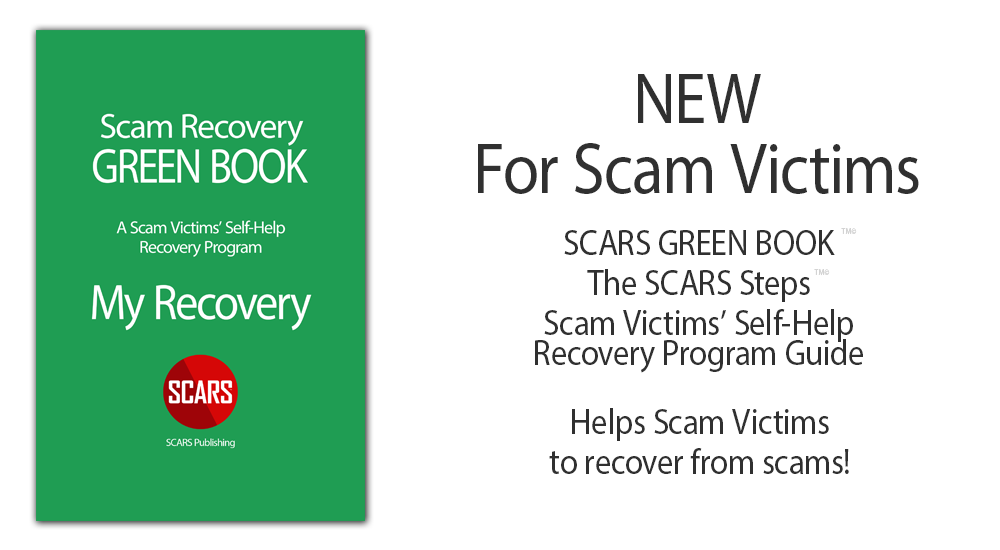SCARS Publishes New Self-Help Recovery Guide
SCARS Re-Launches The SCARS Steps Program In Book Form
From SCARS Publishing
SCARS Is Very Proud To Launch Its Latest Publication: The SCARS GREEN BOOK!
Our New Self-Help SCARS Steps Recovery Guide
SCARS Re-launches the SCARS Steps Program in book form to provide easier access and more flexible availability of this important program!
It is a scam recovery guide for scam victims that helps you recover from your scam.
The GREEN BOOK
This publication is to help Scam Victims recover from their scam experience – A self-help self-paced 8 step recovery program from scams & online fraud
This was created by SCARS Authors: Tim McGuinness Ph.D., Debby Montgomery Johnson, Vianey Gonzalez, Chris Fromal, Sharon Armstrong, Vismaya Rubin, Lydia Zagorova
Visit the SCARS Store to get your copy today!
Designed For Scam Victims!
This program is designed to help scam victims struggling to recover on their own and for those who want to understand the overall process. You can be using other resources, such as trauma counseling or therapy, qualified support groups, or completely independent – on your own!
The SCARS Steps program is a complete program and is provided for the purpose of helping scam victims to overcome this experience.
NOTE: When working with outside support providers (such as trauma counselors,) some aspects may not be as needed but still useful, but when you are facing recovery on your own – which we know that many scam victims will do – it is essential to have a complete program that you can follow, even if you do not perform everything contained in it.
You are encouraged to use this SCARS Program completely.
We Suggest That You:
- Follow the SCARS Steps Program step by step, but take your time. There is no hurry. Each step will happen when you are ready.
- Make sure that you do perform each Step – do not skip steps.
- We recommend that you also join a qualified support group and regularly participate!
This program was designed by the staff of the Society of Citizens Against Relationship Scams Inc. [SCARS] – the world’s leading crime victims’ assistance provider – focused on scam victims in concert with a leading university based upon our nearly 30 years of experience, as a self-help program to assist in the recovery process for those that do not have other means or resources available to them for their scam recovery, or for those that are not ready to take the first step to seek trauma counseling or therapy.
After the trauma of being scammed, you need to take steps to recover and move on. This may be an alternative to counseling in the short term, but we still encourage you to seek out professional help & support.
Your Own Psychology
Throughout this SCARS Steps Program, we speak about issues, challenges, defects, or problems that a victim may have in a generalized way.
Each person is different and it is important to understand your own reasons for being vulnerable to being scammed, how you were lured in, then groomed and manipulated, and then finally your reactions once it ended. (You can learn more about that here.)
SCARS provides a large library of educational articles on all the topics of recovery from scams and the psychology of scams (here on RomanceScamsNOW.com) to help victims better understand these concepts.
THIS GUIDE HAS BEEN DESIGNED TO HELP YOU IF YOU ARE THE VICTIM OF A SCAM! BUT YOU HAVE TO TAKE THE FIRST STEP AND BEGIN THE STEPS TO GET THERE!
Sections (The Steps):
- Step 1 Acceptance
- Step 2 Your Actions
- Step 3 Talk About It
- Step 4 Work On Yourself
- Step 5 Harm To Others
- Step 6 Repair The Harm
- Step 7 Admit Your Mistakes
- Step 8 Moving Forward




Leave A Comment